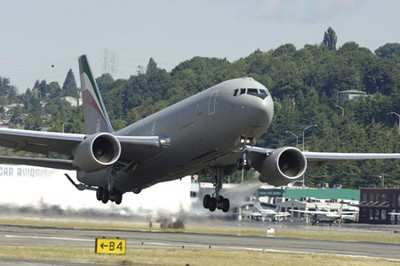Some Falloff Predicted, But No Sweeping Cuts
 The election of Democrat Barack
Obama as the next American president has left onlookers questioning
the future of US defense spending... but aerospace analysis firm
Forecast International predicts spending won't decrease
significantly under an Obama administration.
The election of Democrat Barack
Obama as the next American president has left onlookers questioning
the future of US defense spending... but aerospace analysis firm
Forecast International predicts spending won't decrease
significantly under an Obama administration.
The Pentagon under the Bush administration witnessed
unprecedented budget growth as a result of towering base budgets
combined with hundreds of billions of dollars in supplemental
wartime funding. Given the government's growing deficit and the
fragile state of the US economy, these soaring budgets would have
been deemed unaffordable no matter which party entered the White
House.
"The tremendous spending increases of the last eight years
therefore appear to have come to an end, though that is not to say
that sweeping cuts are looming," said Shaun McDougall, Forecast
International's North America Military Market analyst.
According to FI, having the biggest impact on topline spending
in the near future will be the war in Iraq, as overall levels of
defense spending will gradually decrease as violence declines and
the pace of operations winds down.
"It should be noted, however, that the military will still
require significant recapitalization funds to replace lost or
damaged equipment even after combat troops are withdrawn," stated
McDougall. Obama will stand by this critical investment, though he
will seek to end the days of supplemental spending bills by
consolidating all defense appropriations. This move will provide
improved oversight of wartime funds, and could put an end to some
questionable procurement strategies.

Iraq demonstrated the unpreparedness of US forces to sustain
prolonged ground operations, as proven by extended deployments in
the face of falling readiness levels across the board. In response
to these shortfalls, Obama will continue a plan initiated by
President George W. Bush to expand the Army and Marine Corps by a
combined 92,000 members, which will require a substantial financial
commitment in terms of both personnel costs and associated
equipment.
The National Guard and Reserve forces have also been strained by
the wars, and will require continued investment as they prepare to
face future domestic and foreign challenges. FI says one should
therefore not anticipate the same drawdown that came under
President Bill Clinton following the fall of the Soviet Union.
"The spending vacation of the 1990s has had a dramatic impact on
today's military, one that the Pentagon is still struggling to
recover from," McDougall states. The Air Force's aircraft fleet
continues to age, and the Navy's 280 deployable ships are not
enough to support the service's maritime strategy.
Obama says that the US "must preserve [its] unparalleled
airpower capabilities to deter and defeat any conventional
competitors," and adds that he would support naval recapitalization
by replacing aging ships and modernizing existing platforms.
"This is not to say that the DoD will be impervious to today's
fiscal constraints," Forecast cautions. "Each of the Pentagon's
programs will be assessed by the incoming administration, and
indeed some will be reduced in scope or cut altogether. Missile
defense, the Airborne Laser, and the Army's Future Combat Systems
will face the most scrutiny from an Obama administration early on,
as will efforts to replace a deteriorating nuclear stockpile.
Additional savings can also be expected through sorely needed
acquisition reform, which Obama strongly supports."
Obama's priorities will be made more apparent upon his retooling
of the US National Security Strategy, and even more so following
the release of the next Quadrennial Defense Review, which will
provide a comprehensive long-term view into the administration's
future defense plans.

"Despite a new party in the White House, the new strategic
documents in many ways will contain more similarities with their
predecessor's than differences," McDougall says.
Overall, the Pentagon will face the same daunting challenges on
Inauguration Day that it confronts now... and any administration
would be hard-pressed not to maintain a healthy defense budget.
 ANN's Daily Aero-Term (04.28.24): Airport Marking Aids
ANN's Daily Aero-Term (04.28.24): Airport Marking Aids Aero-News: Quote of the Day (04.28.24)
Aero-News: Quote of the Day (04.28.24) ANN's Daily Aero-Linx (04.28.24)
ANN's Daily Aero-Linx (04.28.24) Aero-News: Quote of the Day (04.29.24)
Aero-News: Quote of the Day (04.29.24) ANN's Daily Aero-Linx (04.29.24)
ANN's Daily Aero-Linx (04.29.24)





